white snowberries
the pearls
in mom’s earrings
Anita Bacha

Many thanks for your visit, my dear friends!
white snowberries
the pearls
in mom’s earrings
Anita Bacha

Many thanks for your visit, my dear friends!
as darkness crept in
she lit a single candle
light flooded the night
Anita Bacha
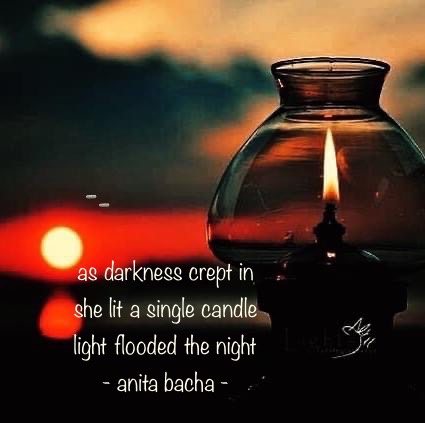
Thank you for your visit, my dear friends!
rime of winter days
stranded banyan hibernates
through curtain of light
Anita Bacha
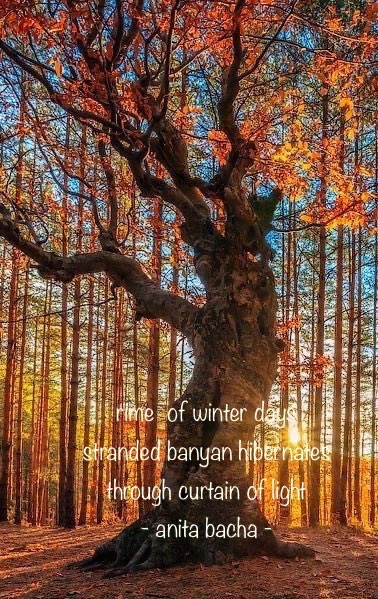
Thank you for your visit, my dear friends
Stay with me
Stay with me as flushes of pink
Stain the petals of the rose
Stay with me as the light
Hovers over the burning wick
Stay with me as the wine
Imbues my breath and thine
Stay with me as the moon
Smiles in the dark night
– Anita Bacha –

Thank you for your visit, my dear friends.
Alabaster moon
Hearkening to thunderstorm
Petrified seamen
Lost in the midst of nowhere
Haunting memories of home
Anita Bacha
Thank you for your visit today, my dear friends.

bright morning sunlight
awakens in a shudder
rainbow butterfly
Anita Bacha
My dear haiku friends , I have recently joined a haiku group, ‘ The Daily Haiku’ on Facebook, Twitter and Instagram. The moderators come up with a prompt word every day plus one extra on weekends. Haikuists are invited to submit their poems to the group for likes and comments by the group members. It’s real fun. An addicted haiku lover , I can’t resist the temptation of contributing to the groups, bearing in mind my doctor’s advice to avoid the internet coz of my aging eyes. O la la!
I have edited my original haiku poem’ sleeping butterfly’
Sleeping Butterfly – Haiku – A Poem by Anita Bacha
To contribute to The Daily Haiku with a 5/75 poem using the prompt word ‘rainbow’.
The rainbow butterfly’s symbolism carries a deep spiritual meaning representing hope, happiness, renewal and the promise of better things to come.
Happy start of the month of October, my dear friends.
Anita Bacha


gluten free breakfast
smoke salmon on brown bread toast
fresh summer berries
Anita Bacha
Photo my own clicked at the Pullman, St.Pancras,London in June 2019.
In that month I was attending a book event, the Jaipur Literary Festival at the British Library. I seized the opportunity to book a room at Pullman and, to kill two birds with one stone, enjoying the luxury of a hotel room vis à vis the British Library and spending memorable time with world acclaimed writers, to name a few, Irving Finkel ,author of ‘ The Lifeboat that saved the world’ , Shashi Tharoor, who has authored many books including ‘ Why I am a Hindu’ and Marcus Du Sautoy the author of the amazing’ The Creative Code – How AI is learning to write,paint and think.’
I have read the three books and other books I bought at the event but, I fell in love with the books of the Master of Haiku, Matsuo Bashō!
Hence, today’s haiku is my offering to you, my dear friends, Thank you for your visit.
Anita Bacha.


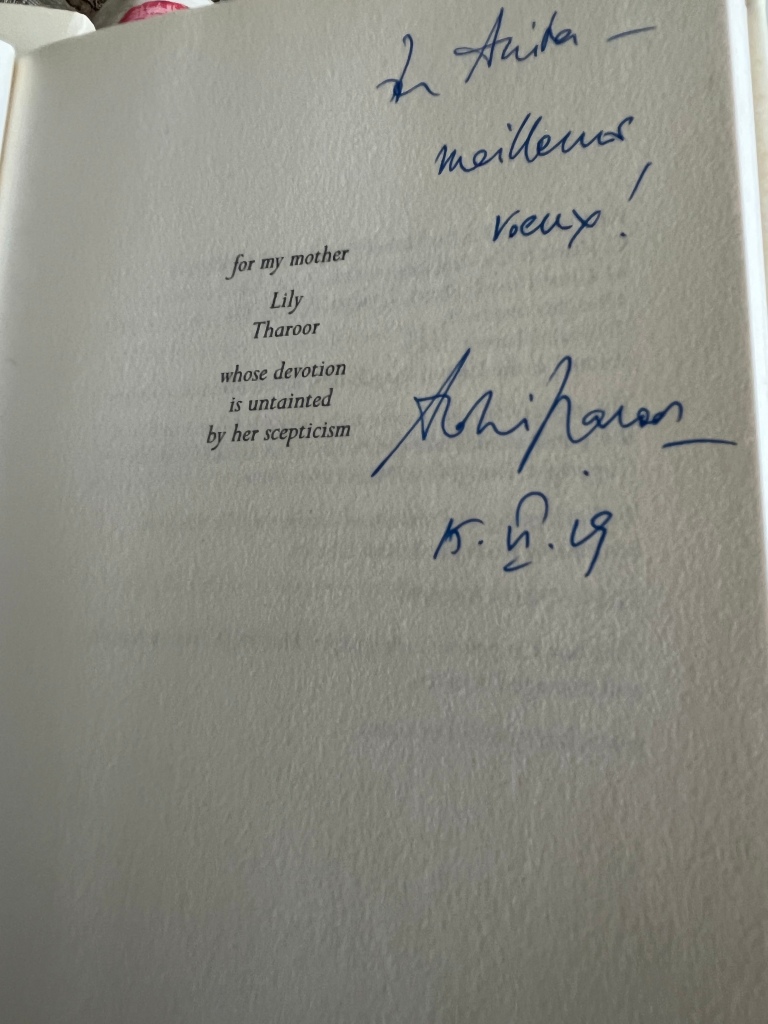
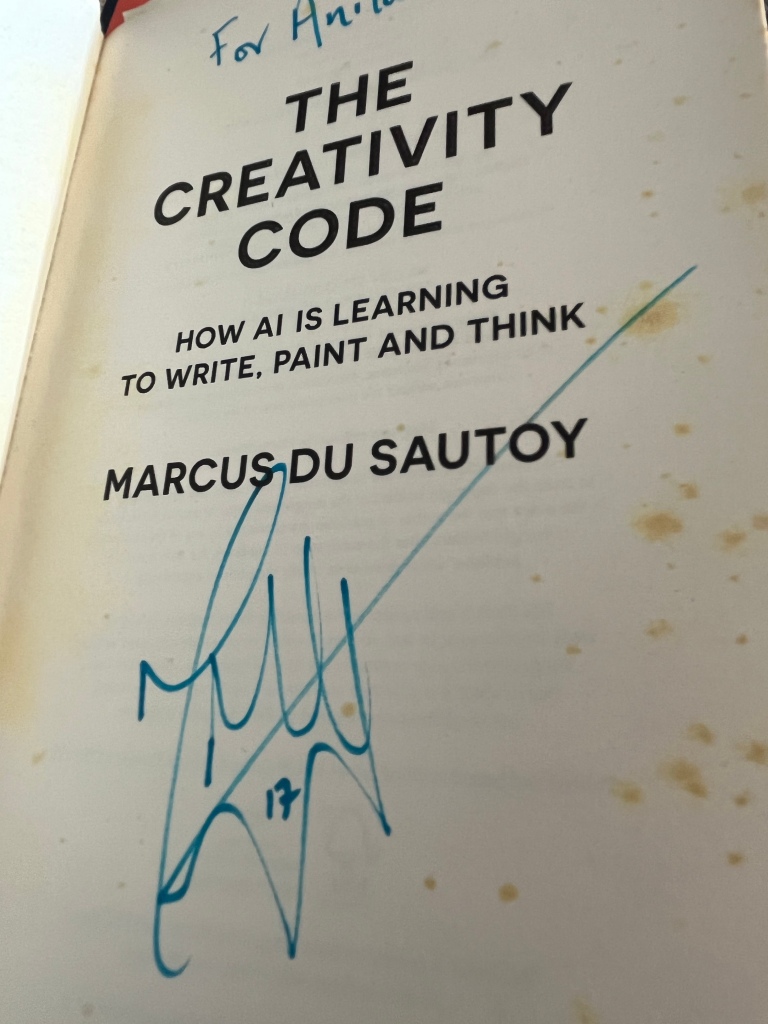
once in a blue moon
sky watchers immensely graced
with celestial awe
– Anita Bacha –
Thank you for your visit, my dear friends.
You may wish to view the only blue moon of 2023 on 30 August as it rises this week ( source space.com)
https://www.space.com/super-blue-moon-august-2023-one-week-away

Obon Festival
The light of an old lantern
Dispels the shadows
– Anita Bacha –
Many thanks and heartfelt gratitude to Japan Haiku Society for featuring my haiku ‘Obon Festival’ as Haiku of the Week (Week 33).
Congratulations to all the other selected poets.

http://www.japansociety.org.uk/haiku-corner
Sharing a few other haiku, thank you for your visit, my dear friends.
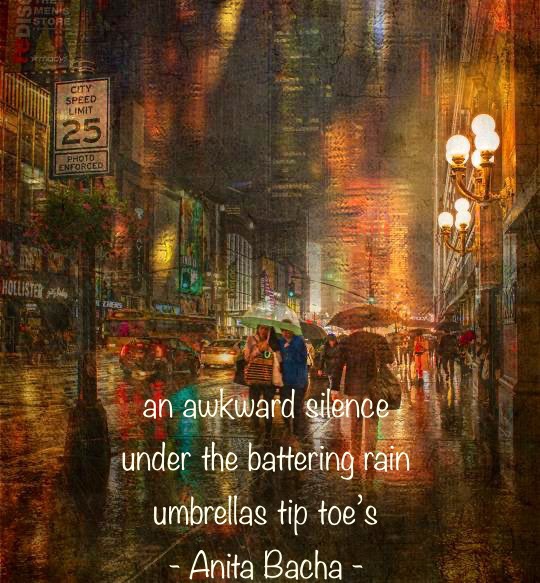


windy and wet night
letting go of our brolly
we dance in the rain
Anita Bacha
Many thanks to Japan Society Haiku Corner for selecting and featuring my haiku in the issue of Haiku of the week ( week 32).
Congrats to all the other selected poets.
https://www.japansociety.org.uk/?pg=haiku-corner#a
Thank you for your visit, my dear friends!
